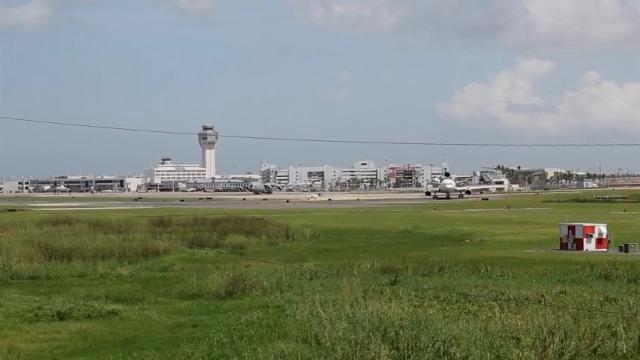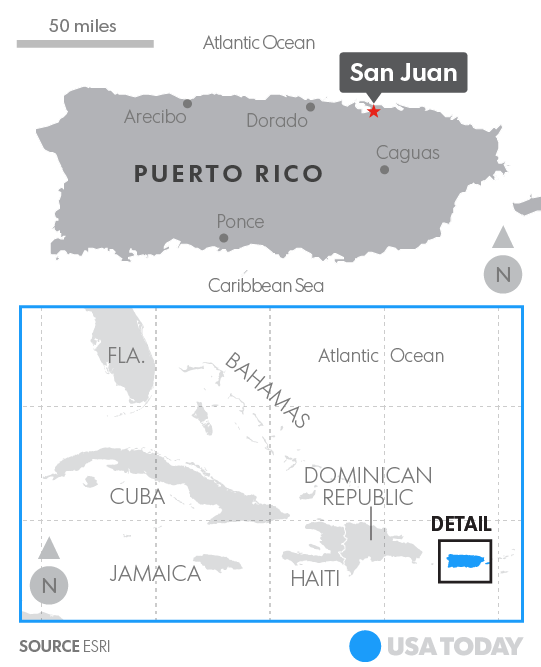begin quote from:
The
destruction wrought by Hurricane Maria on the 3.4 million residents of
Puerto Rico resurfaced a disturbing fact – many Americans don't know the
first thing about the …

Hurricane Maria's destruction of Puerto Rico resurfaced a disturbing
fact. More than half of Americans don't realize Puerto Rico is a U.S.
commonwealth.
USA TODAY
The
destruction wrought by Hurricane Maria on the 3.4 million residents of
Puerto Rico resurfaced a disturbing fact – many Americans don't know the
first thing about the Caribbean island.
A USA Today/Suffolk University poll conducted in March found that fewer than half of Americans (47%) believe that Puerto Ricans are U.S. citizens by birth.
They are.
Instead,
30% of the people surveyed thought residents of the island are citizens
of Puerto Rico. Another 21% just didn't know where the people of Puerto
Rico belong.
That may help explain why the nation
rallied behind the victims of Hurricane Harvey in Texas and Hurricane
Irma in Florida, but have not responded in the same way to the victims
of Hurricane Maria in Puerto Rico.
"What I fear is
that the federal government is not stepping up as fully and as quickly
as we must," Rep. Luis Gutierrez, D-Ill., whose parents are Puerto
Rican, said on the floor of the House of Representatives on Tuesday. "We
need an air lift. We need an effort the scale of Dunkirk. We need the
federal government to go all in."
President Trump
announced Tuesday morning that he will visit the island next week, but
confusion remains. So what exactly is Puerto Rico?

Puerto Ricans are trying to make contact with relatives and friends
after Hurricane Maria knocked out power and telephone services. Hundreds
of other residents and tourists packed San Juan Airport on Sunday,
which is barely functioning. (Sept. 25)
AP
It's a U.S. commonwealth
Puerto
Rico first became a U.S. territory following the Spanish-American War,
which was ignited by the explosion of the U.S.S. Maine in Havana Harbor
in 1898. The war ended with the U.S. acquiring many of Spain's
possessions, including Cuba, Guam, the Philippines and Puerto Rico.
In
1952, Puerto Ricans adopted a new constitution, which established the
current relationship of Puerto Rico as a commonwealth of the United
States.
Under that arrangement, Puerto Rico shares
many similarities to U.S. states. Its residents elect their own
legislative assembly, a governor, and a representative to the U.S. House
of Representatives. But unlike U.S. states, Puerto Ricans on the island
cannot vote in presidential elections, and their representative in the House — known as a resident commissioner — has no vote.
The island also has a Federal Affairs Administration,
based in Washington, D.C., which represents the island before the
federal government, the 50 state governments and U.S. businesses.
Its residents are U.S. citizens
In 1917, the U.S. Congress passed the Jones–Shafroth Act, which grants U.S. citizenship to anyone born on the island.
As
U.S. citizens, Puerto Ricans can freely travel and move to the U.S.
mainland without a passport or a visa. For Puerto Ricans, traveling to
the mainland is the same as a New Yorker crossing into New Jersey or
flying to Hawaii.
Thousands of Puerto Ricans have
taken advantage of that in recent years as the island's finances have
crumbled. From 2006 to 2015, about 445,000 left the island for the
mainland, more than 10% of the island's population, according to the Puerto Rico Statistics Institute. Most of them live in New York, Florida, and New Jersey.
As
citizens, Puerto Ricans can also volunteer to serve, or be drafted
into, the military. About 18,000 Puerto Ricans served in World War I,
65,000 in World War II, 61,000 in the Korean War, and 48,000 in Vietnam,
according to Puerto Rico's former governor Luis Fortuño.
Puerto Ricans get some, but not all, federal benefits
As
U.S. citizens, Puerto Ricans receive many of the same financial
benefits, and liabilities, of their mainland counterparts. They pay most
federal taxes, including payroll, Social Security and Medicare taxes.
But they do not pay federal personal income taxes.
Puerto
Ricans receive many, but not all, federal benefits. For example, the
federal government matches 100% of Medicaid funding for people living in
the 50 states and the District of Columbia, but matches only 57.2% of
Medicaid expenditures for residents of Puerto Rico. Congress has also capped annual Medicaid spending in Puerto Rico.
Finances in Puerto Rico were dire even before Maria hit
Hurricane
Maria hit the island at the worst possible time as the government was
already grappling with a historic economic crisis that has forced the
closure of schools, hospitals and other government services.
In May, an oversight board appointed to manage the crisis filed for
the equivalency of bankruptcy protection. The government is being
crushed by $74 billion in debts and $49 billion in pension liabilities,
but its creditors are worried the island will default on its payments.
Even
Trump raised that concern in a series of tweets Monday night lamenting
the "billions of dollars owed to Wall Street and the banks which, sadly,
must be dealt with."

No comments:
Post a Comment